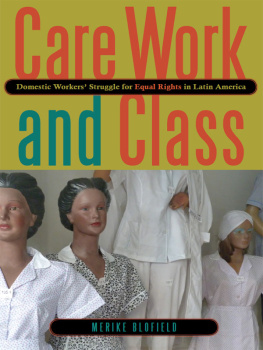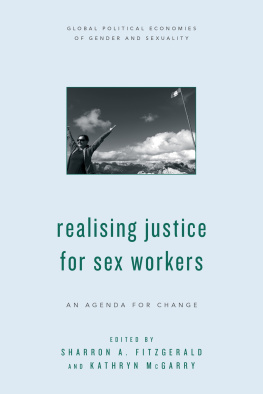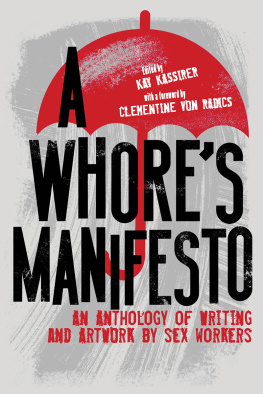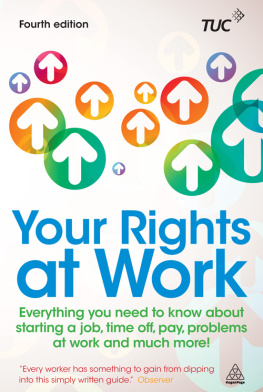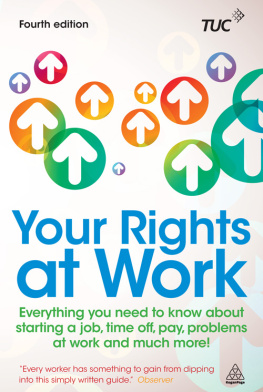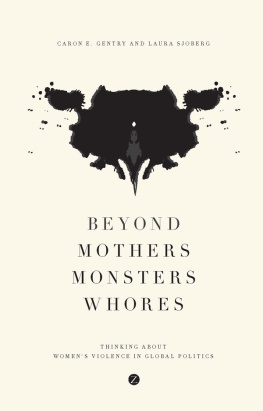

Published in 2015 by the Feminist Press
at the City University of New York
The Graduate Center
365 Fifth Avenue, Suite 5406
New York, NY 10016
feministpress.org
Selection and compilation copyright 2015 by Rachel Aimee,
Eliyanna Kaiser, and Audacia Ray
Introduction and timeline copyright 2015 by Rachel Aimee,
Eliyanna Kaiser, and Audacia Ray
Individual copyrights retained by contributors.
All rights reserved.
No part of this book may be reproduced, used, or stored in any information retrieval system or transmitted in any form or by any means, electronic, mechanical, photocopying, recording, or otherwise, without prior written permission from the Feminist Press at the City University of New York, except in the case of brief quotations embodied in critical articles and reviews.
First printing March 2015
Cover design by Herb Thornby, herbthornby.com
Text design by Drew Stevens
Library of Congress Cataloging-in-Publication Data
$pread : the best of the magazine that illuminated the sex industry and started a media revolution / edited by Rachel Aimee, Eliyanna Kaiser, and Audacia Ray.
pages cm
ISBN 978-1-55861-873-2 (ebook)
1. Spread (New York, N.Y.) 2. Sex-oriented businesses. I. Aimee, Rachel editor. II. Kaiser, Eliyanna editor. III. Ray, Audacia editor. IV. Title: Spread.
PN4900.S67S67 2013
051--dc23
2014037096
CONTENTS
Rachel Aimee, Eliyanna Kaiser, and Audacia Ray
Like any movement for social change, the sex worker rights movement has gone through many phases and been challenged both internally and externally by people, ideas, and events beyond its control. It has experienced wins and losses, and it has reimagined its goals and values with each successive generation of leaders and activists who have taken up its banner. To better understand the writings of the sex workers who wrote for $pread magazine, this preface will attempt to provide some context to the movement in its historical moment.
Sex Work and Sex Workers
Major news networks use it today, but the term sex work was first coined by Carol Leigh (aka Scarlot Harlot) at an activist conference in 1978. While its contemporary, popular usage might suggest a polite synonym for prostitute, its intended meaning is much broader, encompassing anyone who exchanges money, goods, or services for their sexual or erotic labor. The purpose of inventing the term wasnt about being polite, although sex work does nicely sidestep the stigma embedded in some of the more charged monikers. But more significantly, the idea of connecting all professions that exchange sexual or erotic work under one umbrella served as a linguistic labor organizing tool, connecting porn performers, fetish workers, exotic dancers, prostitutes, phone sex workers, and others, with one label, recognizing their shared stigma and struggle, regardless of their differences. And, since the first job of any social change movement is a gathering of its ranks, or what some feminists have called consciousness-raising, the invention of the term sex work most effectively jump-started todays sex worker rights movement.
Back when $pread began publishing in 2005, it was uncommon for sex workers to identify as sex workers, and while it has become much more common over the past decade, its usage among non-activist sex workers is still relatively rare, for various reasons. Some strippers, pro-dommes, and others whose jobs may not actually involve having sex for money, are offended by the suggestion of commonality with prostitutes. Other people reject the identity because they dont think of what they do as a job, or because they are uncomfortable with the stigma associated with the term. In the years since $pread ceased publication, the mainstream sex worker rights movement has begun to acknowledge that the term sex worker doesnt work for everyone.
Feminism and the Politics of Choice
Far more insidious than its infamous cousin, the virgin/whore complex, the choice/coercion dichotomy has complicated the relationship between sex worker activists and feminists for decades. In the early 2000s, mainstream feminists approached the issue of sex work with a near copy/paste of some of their foremothers arguments from the 1970s and 80s. What was once considered the radical thinking of the feminist sex wars had gone mainstream: the idea that sexualized labor, particularly pornography and prostitution, is inherently degrading to and exploitative of women. Meanwhile, the opposing view advanced by sex-positive feminists essentially argued the opposite: sex work represents an empowering way for women to use their bodies, leveraging financial independence from sexual self-expression. (This narrative, of course, ignored the fact that not all sex workers are cisgender women.) While it would be too simple and reductionist to suggest that no nuance existed within either of these two philosophical factions, it would be close to the truth.
As sex trafficking became recognized as an important problem in the United States, many anti-sex work feminists began to use the words trafficking and prostitution as synonyms, both in their rhetoric, and in their policy-making and lobbying. Proposals to combat trafficking enjoyed easy supportboth political and financialand anti-prostitution efforts could easily pass for anti-trafficking ones. Throughout the early 2000s, a near-constant onslaught of laws and policies heavily curtailing the rights of sex workers were adopted as anti-trafficking measures.
And so, just as sex workers had begun to come out in droves, harnessing the relatively anonymous power of the Internet to self-identify and self-articulate, they found themselves in a predicament. To claim choice meant challenging institutional feminism. And to claim coercion meant being trapped in victim-status. No sex worker activist or group easily escaped reacting to this reality.
Its not surprising that many young sex worker activists allied with the sex positive feminists. They at least acknowledged that sex workers had enough autonomy to be capable of choice and self-determination. Sex workers have long been in the crossfire of warring feminists, and the rhetoric of empowerment was understandably more alluring than degradation. But the alliance forged between sex-positive feminists and the sex worker rights movement was sometimes problematic because it led to a culture in which it was necessary to constantly assert ones autonomy, even if that meant not speaking up about experiencing violence, coercion, or personal difficulty with sexual shame, thus favoring those who were most empowered (or able to pass as empowered) by their work: mostly white, middle-class, non-immigrant, cisgender women.
Rhetorically, this led to some of the main messages of the sex worker rights movement further isolating less privileged sex workers. The constant assertions that sex work was just like any other job, that it was experientially rewarding, richly enumerating, or spiritually significant, or that sex workers werent all homeless junkies working the streets naturally alienated those who hated their work, struggled to make ends meet, used drugs, or were homeless. A dominating narrative of empowerment also contributes to a growing stigma against sex workers whose experience isnt strictly empowering.
None of this is to say that a more diverse group of sex workers were not speaking up or were not active at the time. They most certainly were. With some very notable exceptions, they largely worked within other movements, particularly anti-poverty, harm reduction, and criminal justice reform movements. While todays sex worker rights movement remains far from perfect in terms of representation and meaningful leadership, the last few years have seen a noticeable shift toward acknowledging how many communities of sex workers have been left out of the conversation.
Next page


